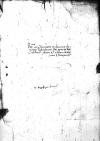List #105
Ioannes DANTISCUS do Tiedemann GIESEHeilsberg (Lidzbark Warmiński), 15[40]-08-23
Regest polski:
Dantyszek zwraca uwagę Giesego, że zawczasu przewidywał negatywną reakcję Aleksandra [Scultetiego] na przesłane mu articuli [zawierające propozycje porozumienia]. Wobec braku nadziei na porozumienie Dantyszek wyraża opinię, że nie należy doradzać królowi [Zygmuntowi I Jagiellonowi], by przedłużał bezpieczeństwo Aleksandra. Aby jednak uniknąć oskarżeń o kierowanie się gniewem i goryczą, Dantyszek prześle articuli kapitule [warmińskiej] i zawiadomi adresata o poczynionych z nią ustaleniach.
Dantyszek deklaruje, że nie będzie się sprzeciwiał wyjazdowi Aleksandra do Wrocławia. Zgodziłby się też na jego wyprawę do Rzymu, a nawet na Antypody. Tymczasem Aleksander wysłał do Rzymu Grzegorza Krendnera w celu uzyskania zgody na korzystanie z dochodów z diecezji warmińskiej, choć wiadomo, co stanowią statuty kapituły.
Sprawa [porozumienia] wydaje się Dantyszkowi stracona, lecz jeżeli Aleksander opamiętałby się, byłby każdemu miły.
Przypomniał sobie o dawniejszej prośbie Giesego o wysłanie kopii listu królewskiego do opatów. Sprawą tą zajmuje się Achacy Cema, który odwiedził Dantyszka w Lidzbarku 18 sierpnia.
Król Węgier [Jan Zapolya] został tknięty apopleksją bez nadziei na ratunek; prawdopodobnie z tego powodu król [Zygmunt] cierpi na silny ból ramion. Podobno także królowa [Bona] źle się czuje. Przekazuje list biskupa włocławskiego [Łukasza Górki] z pozostałymi nowinami.
| odebrano [1540]-08-25 Rękopiśmienne podstawy źródłowe:
| ||||
Tekst + aparat krytyczny + komentarz Zwykły tekst Tekst + komentarz Tekst + aparat krytyczny Ekscerpty dotyczące podróży Dantyszka
Reverendissimo in Christo Patri et Domino, domino
Reverendissime in Christo Pater, domine frater et amice carissime et honoran(de) or honoran(dissime)⌈honoran(de)honoran(de) or honoran(dissime)⌉.
Salutem et fraternam commendationem.
Gravem tolerationem domino
Porro quod
Ceterum memini, quod superioribus cf.
Nova, quae iis diebus accepi, mitto. Quae remitti peto. Existimo iam notum esse Dominationi Vestrae Reverendissimae serenissimum
Dat(ae) or Dat(um)⌈Dat(ae)Dat(ae) or Dat(um)⌉
Reverendissimae Dominationis Vestrae frater integerrimus


 BCz 1596, p. 510
BCz 1596, p. 510